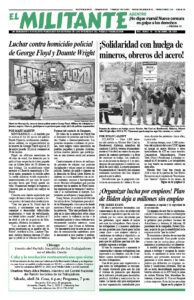CHICAGO — Four days after his release from prison, Gerald Reed, accompanied by supporters, told a news conference here, “This is a dream come true. I always told my family members that I’d come home, but I was wondering when.”
Reed was freed following the commutation of his life sentence by Illinois Gov. J.B. Pritzker April 1.
“I left part of my heart back there” in prison, he said. “It’s hard leaving somebody behind, and on top of that, they are innocent as well. They don’t have the same attention I have. My shoutout is for them.”
Reed’s supporters waited six hours outside the prison, chanting for him to be released. As the car carrying him arrived outside Stateville Correctional Center, they burst into cheers.
Reed had been incarcerated for nearly 31 years following his wrongful conviction for a double murder on Chicago’s South Side in 1990. The detectives who arrested Reed — part of notorious Chicago police Cmdr. Jon Burge’s “midnight crew” — took him to a police station where they tortured him into confessing to murders he had not committed.
The Illinois Torture Inquiry and Relief Commission, created in 2009 after protests forced out the facts about Burge’s cop torture operation, examined Reed’s case in 2012 and ruled his claims of torture as credible.
Burge and his subordinates tortured dozens of people — mainly Blacks — to gain false confessions.
It took until December 2018 before Cook County Judge Thomas Gainer overturned Reed’s 1991 conviction, ruling his “confession” had been extracted through torture. But prosecutors blocked his release, demanding a new trial.
In a blow to Reed and to the Bill of Rights, Circuit Court Judge Thomas Hennelly reversed Gainer’s ruling in February 2020, ordering Reed to serve the remainder of the life sentence. Hennelly had been assigned to take over Reed’s case after Gainer retired.
It was only the governor’s commutation that finally set him free. Though released, his 1991 conviction still stands.
Elliot Zinger, one of Reed’s attorneys, has petitioned the state Supreme Court seeking to overturn Hennelly’s ruling and vacate his conviction once and for all.
Speaking at Reed’s news conference, Armanda Shackelford, his mother, thanked all those who helped in the fight to free her son. She said the fight was not just for him.
Mark Clements is an organizer for the Chicago Torture Justice Center.

